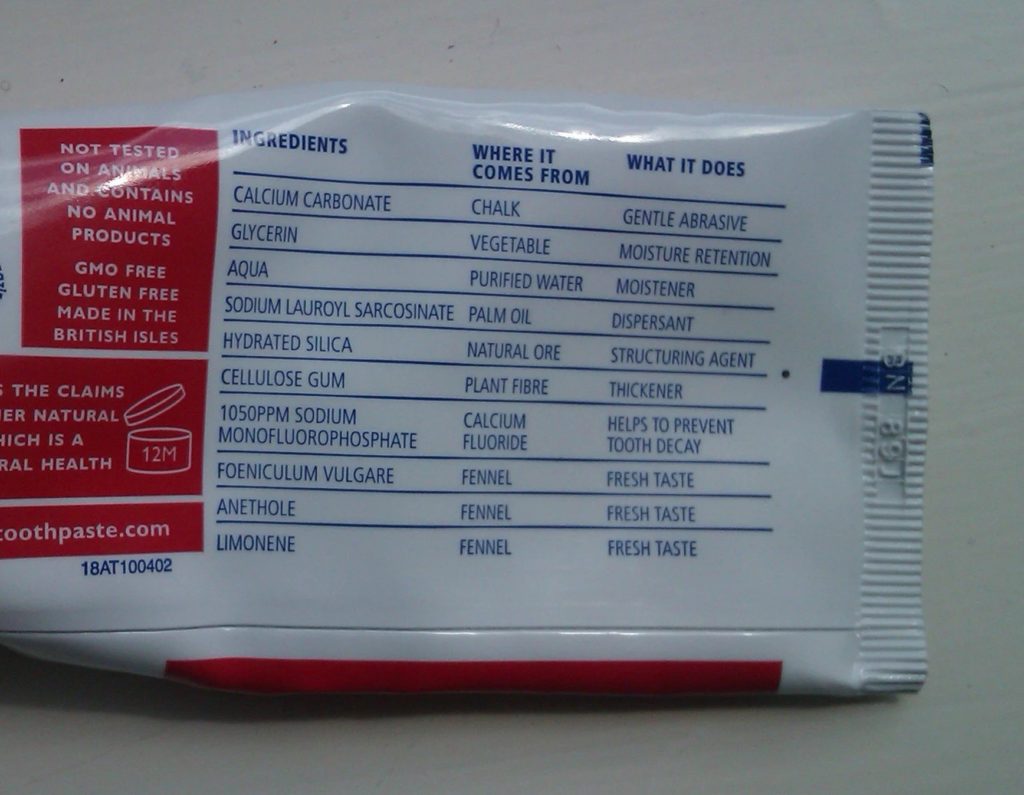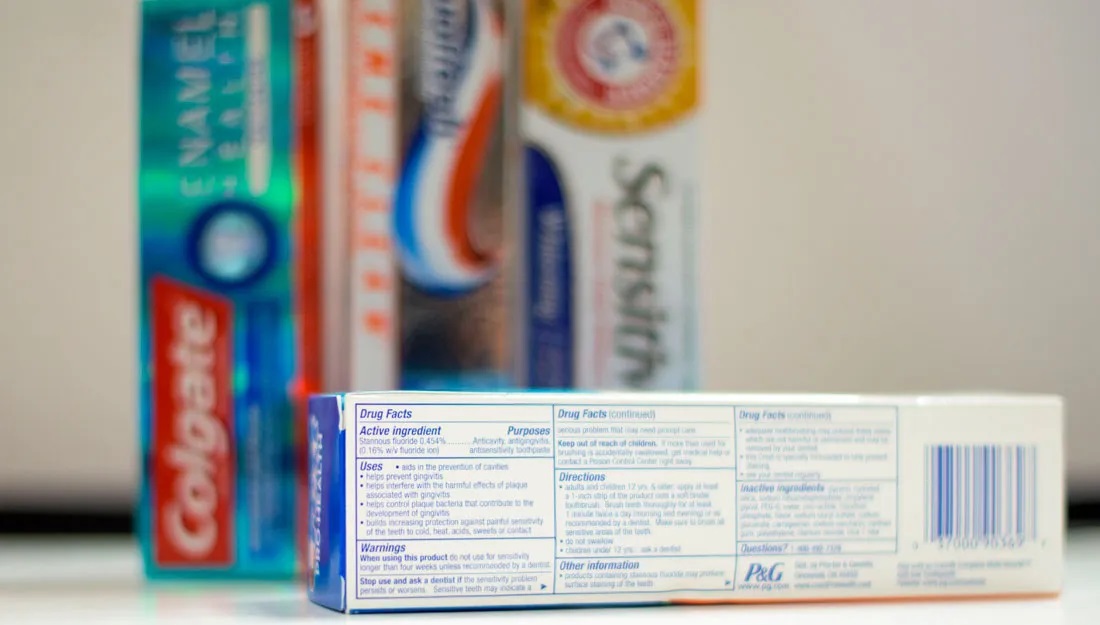Cracking the Code on Toothpaste Ingredients
When it comes to your health, it’s important to be as informed as possible on the products you use to take care of yourself. Choosing products that are best suited to your specific needs helps you get better results from your efforts, and that includes things as seemingly simple as the toothpaste you use. In this article we’ll help you learn what to look for in toothpaste, and understand what the different ingredients are, and what they’re designed to do.
These days, we are much more in tune with the ingredients used to make the products we buy than we used to be. It’s easier than ever to learn about the pros and cons of different substances and materials, and get the facts from trusted sources. For this reason, we felt it was important to provide this helpful guide on what people should really know about the toothpaste they buy to help take care of their teeth and keep them healthy and strong. Not all toothpastes are created equal, but knowing more about what they are made from and the various benefits of the different ingredients will help you narrow the field and make an informed decision on which one is best for you.
But, before we get into that, let’s quickly talk about the actual function of toothpaste, and the most popular subcategories of toothpaste that you’ll find on store shelves across Canada.
What Exactly Does Toothpaste Do?
The primary job of toothpaste is to promote good oral hygiene by enhancing the cleaning effects of the toothbrush and delivering beneficial effects to the teeth and gums. These effects include strengthening the tooth enamel, protecting against the formation of cavities, inhibiting bacterial growth, minimizing the build-up of plaque, removing visible stains from the teeth, and more.
Toothpaste should always be a part of your daily oral health care routine, as the benefits become cumulative over time with repeated and regular use. Depending on the needs of the individual, there are many types of toothpaste to choose from.
What are the Different Types of Toothpastes?
Anti-Cavity Toothpaste
Virtually all toothpastes will have anti-cavity characteristics, so most of the popular toothpastes you’ll find on store shelves will fit into this category. Available in a wide range of flavours, these toothpastes offer essential protection against tooth decay when used daily and in conjunction with the recommended regular schedule of dental checkups.
Kids Toothpaste
Many popular toothpastes have strong flavours to help freshen the breath and provide a pleasant brushing experience, but these are often too intense for the taste buds of children. Kids toothpastes are milder and are available in kid-friendly flavours like fruit, bubble gum, and other sweet tastes. The amounts of anticavity ingredients in children’s toothpaste will also be reduced accordingly, as their needs are different from those of grown adults.
Whitening Toothpaste
By adding ingredients that are more effective at removing stains and discoloration from teeth, whitening toothpastes gradually brighten teeth over time. Whitening toothpastes are usually available in varying levels of intensity, and with long-term usage can have a noticeable benefit to the whiteness of teeth, making the smile look more uniform and brighter.
Sensitivity Toothpaste
Some people are more susceptible to experiencing discomfort when their teeth come into contact with extreme temperatures, such as when hot or cold food and drinks are consumed. Tooth sensitivity can be reduced by brushing regularly with a toothpaste formulated with desensitizing ingredients.
Antibacterial Toothpaste
Keeping bad breath under control can be a struggle for many people, so anti-bacterial breath-freshening toothpastes are very popular. These toothpastes have similar characteristics to mouthwashes and anti-bacterial oral rinses, inhibiting the growth of bacteria that is responsible for foul breath as well as helping to reduce plaque build-up.
Within each of these toothpaste categories, the base ingredients will be quite consistent. However, depending on the specific type of toothpaste and the characteristics of them, additional ingredients will be used to provide the added benefits. Let’s explore the various ingredients that are used in most of the common and popular varieties of toothpaste.
What are the Main Toothpaste Ingredients & What Do They Do?
 Fluoride
Fluoride
Perhaps the most universal ingredient in toothpastes today is fluoride. Fluoride is a mineral that absorbs into the teeth in order to strengthen and protect tooth enamel, thereby reducing the likelihood of tooth decay. Dental associations around the world are all in unanimous agreement that fluoride toothpastes, when used as directed, are an effective way for people to help protect their teeth against tooth decay.
Hydrogen Peroxide
Over time, teeth can become stained and discolored due to repeated exposure to certain foods and drinks. To help remove minor surface stains and improve the whiteness of the teeth, hydrogen peroxide is often used in toothpaste in small quantities. Whitening toothpastes are very popular, but they must be used frequently and for a long period of time to be most effective.
Calcium Carbonate & Sodium Bicarbonate
To aid in the cleansing of the teeth, abrasive ingredients like calcium carbonate or sodium bicarbonate (aka: baking soda) are common in many toothpastes. These gentle abrasives work to help scrub teeth clean and loosen stuck-on plaque, bacteria, and food debris. It’s worth noting that only very mild abrasive toothpastes should be used, as rougher abrasives can actually damage the tooth enamel over time.
Dioctyl Sodium Sulfosuccinate & Sodium Lauryl Sulfate
One of the distinctive characteristics of toothpaste is the familiar foaming effect that is created when the toothpaste becomes agitated in the mouth. This effect is created by detergent ingredients such as dioctyl sodium sulfosuccinate or sodium lauryl sulfate. This foaming action helps to distribute the other ingredients in the toothpaste, such as fluoride, throughout the mouth and into the smaller gaps in between the teeth for more complete coverage.
Strontium Chloride & Potassium Nitrate
For people with tooth sensitivity, toothpastes containing strontium chloride & potassium nitrate are recommended to help reduce the discomfort of eating or drinking hot and cold foods. These active ingredients have a soothing effect on the nerve endings in the teeth, making the pain receptors have a milder reaction to hot and cold temperatures.
Glycol & Glycerol
In order to keep toothpaste shelf-stable for an extended period of time, ingredients known as glycol and glycerol are included. These are known as humectants, and work to retain moisture in the toothpaste compound to help prevent it from drying out and extend its shelf life, even long after the tube has been opened.
Sweeteners & Artificial Flavours
Sugar-free sweeteners like sorbitol or saccharin are used to enhance the taste of the toothpaste, and are usually blended with popular artificial flavours like mint and citrus. By selecting a pleasing taste, people are more likely to brush for longer periods of time, and with an increased frequency. This is particularly relevant for children, as it can sometimes be a challenge to establish a solid oral health care routine in young kids.
Triclosan
Toothpastes that are marketed as having breath-freshening characteristics will likely contain an antibacterial agent known as triclosan. Triclosan works to fight the bacteria that is responsible for the formation of plaque on the teeth, thereby reducing the risks of developing gum disease, and freshening the breath with greater effectiveness and for a longer period of time when compared to regular toothpastes.
Are There Any Toothpaste Ingredients That Should Be Avoided?
In general, most of the popular toothpastes on the shelves of stores across Canada are perfectly safe, as they must pass strict health regulations in order to be approved for sale. Nevertheless, there are some variations of toothpastes that may contain specific ingredients that could be troublesome. Here are the most common toothpaste ingredients that in certain cases could potentially react negatively for some people.
For example, the foaming agent ingredient sodium lauryl sulfate has been shown to cause irritation for some people who are more sensitive to this substance. Fortunately, there are alternative ingredients that perform the same function and do not elicit the same allergic reaction. If you find that you are experiencing discomfort when brushing, particularly in the form of gum irritation, talk with your dentist about it. They should be able to determine if it’s the result of sodium lauryl sulfate sensitivity, or some other underlying cause.
In addition, charcoal has recently increased in popularity as a do-it-yourself tooth whitening treatment thanks to amateur videos circulating on the internet and social media. However, excessive or daily use of charcoal toothpastes can cause negative effects such as premature wearing down of tooth enamel. This critical information is rarely shown in these viral videos, leading some people to unknowingly damage their teeth in an effort to whiten them.
Charcoal can even potentially stain and discolor artificial teeth, as well as the material used in dental repairs such as bonding or fillings. While there are some home remedies that can have beneficial effects on the health of the mouth, it’s always important to discuss the specifics of them with your trusted dental professional before trying anything on your own.
Taking Better Care of Your Mouth with Proper At-Home Oral Care Habits
Choosing the right toothpaste is about more than just getting your teeth clean or freshening your breath. It’s the foundation of maintaining an effective at-home oral care routine that promotes strong and healthy teeth, which in turn makes the treatments you receive at your dentist even more impactful. This means brushing with proper technique, using a good quality toothpaste, flossing regularly, and using antibacterial oral rinses. These efforts in combination work to minimize bacterial growth and prevent future dental health problems before they can start. Cleaner teeth, healthier gums, and better overall dental health can have a profound effect on your general well-being.
If you are wondering if your toothpaste is really the optimum choice for your specific needs, the best thing to do is to have an open discussion with your dentist. Contact Georgian Dental today to arrange for your next dental appointment and get some helpful advice on the types of dental health products that are best for your mouth. We’ll be glad to answer any questions you have and guide you towards the best choices for toothpaste, toothbrushes, floss, mouthwashes, and more!
Appointment Request
If you’re interested in any of our procedures, and would like to meet with one of our dentists to discuss options, costs and get additional information, complete this short form and we’ll give you a call to arrange for a no-obligation appointment at our Barrie clinic.










